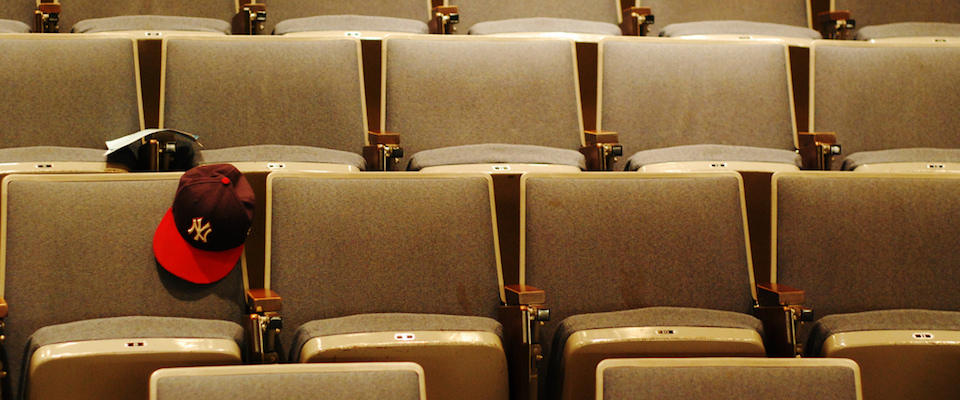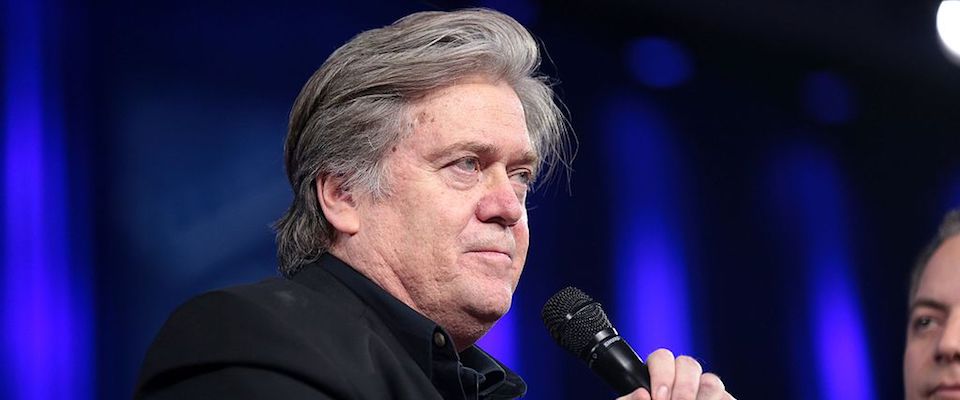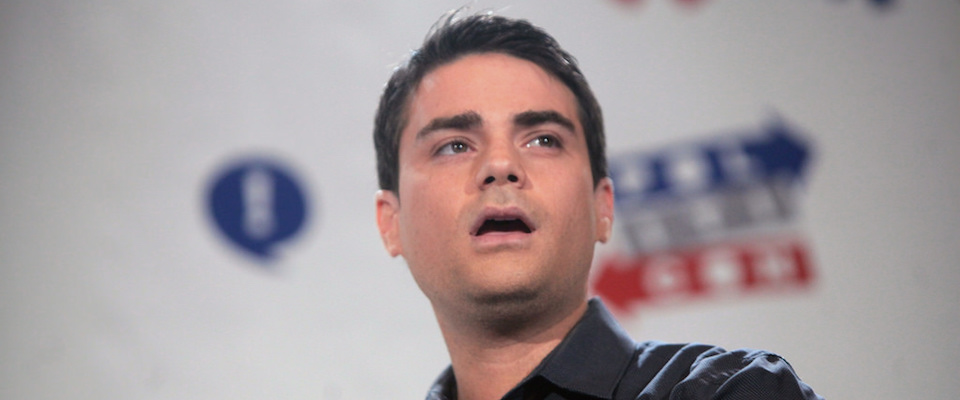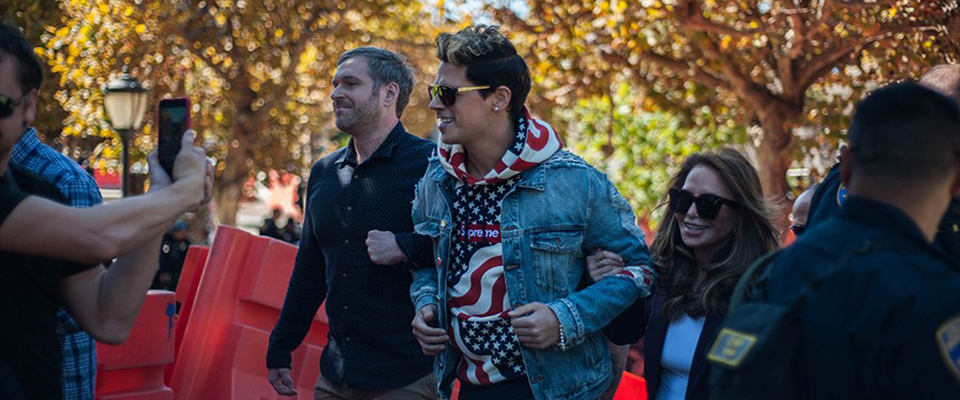It’s been about a week since Ann Coulter tried but failed to speak on the Berkeley campus, and the outrage continues unabated. Outrage that once again a conservative was silenced on a liberal campus. Outrage that the university cancelled her appearance and refused to provide appropriate protection for her. Once again, the birthplace of the Free Speech Movement is depicted as a place where free speech—at least for conservatives—went home to die. But what actually happened between the university, Coulter and the three student groups that wanted to host her? Here’s our attempt to set the record straight on several misconceptions about the Coulter incident.
Misconception 1: UC Berkeley cancelled the Ann Coulter event.
Among the most popular rumors is one of Berkeley cancelling Coulter’s event—a claim reported by the Los Angeles Times, New York Times, and The Washington Post, among other mainstream publications, with Chancellor Nicholas Dirks even referring to the event as “now-cancelled” in an op-ed the day before the event.
But in actuality, the university never agreed to host Ann Coulter in the first place.
“There was no event cancelled, because it was never scheduled,” says Berkeley assistant vice chancellor Dan Mogulof. “[The student groups] signed [their own] contract with Coulter committing to a particular date without first checking with the campus about whether there was a venue actually available on that date.” The university learned that Coulter was coming to the campus on April 27 by reading about it in the newspaper.
Much of the evidence to support this assertion seems to be found, ironically, in the email exchanges included in the lawsuit that two of the student groups—The Young America’s Foundation (YAF) and Berkeley College Republicans (BCR)—filed against the university, which has yet to file its own legal response.

According to the emails used as evidence in the lawsuit, BridgeCal—the third group that wished to hold the Coulter event as a part a free and fair political speaker series—sent a message to the university on March 17 saying that Coulter might be coming to speak, with no mention of an official date: “We believe we have a 50% chance of Ann Coulter coming to speak in the last week of April. The other 50% would be her coming next semester.… What do we need to know about security fees and if there are fees for booking large auditoriums like Pauley… ?” They also said that they were considering selling tickets—a detail that limited their options because tickets sales are only allowed at a discrete number of campus venues. Nothing was set in stone.
About two weeks later on March 28, the BCR sent an email to Berkeley declaring their intention to host Ann Coulter on April 27. She would be one participant in a speaker series on illegal immigration organized by BridgeCal. This email gave the university 30 days’ notice that she had been formally invited to come speak. The groups then put in a room request for 500 people, a detail that also limited their venue options.
One of the claims made by YAF and the BCR is that Berkeley had ample time to find a venue for Coulter, since it had managed to find one within that time frame for another speaker in the series. That speaker was Maria Echaveste, policy and program development director at Berkeley Law and a Clinton-era White House advisor. Echaveste was invited as the liberal counterpoint to Coulter, and she did speak on April 17 at 7 p.m.
But in the case of Echaveste, 40 people attended her event, and there were limited concerns over campus security, particularly since Echaveste is a member of the faculty. And while YAF claims that the university refused “to provide a proper venue for six weeks” the emails filed in the lawsuit contradict that assertion.
There are 50,000 people at the school and Wheeler Hall is closed for seismic retrofit and renovation, leaving few sites that can accommodate an audience of 500, and that are “protectable” according to the police, Mogulof says. Given all that, the university could not quickly find a spot to host Coulter.
Misconception 2: The university was responding to loose threats, not concrete evidence that there would be violence at Coulter’s speech, so they wrongfully prevented her appearance.
According to the lawsuit, Berkeley kept Coulter from speaking by invoking the “heckler’s veto,” which occurs when someone’s right to free speech is restricted to prevent a reacting party’s behavior.
“Defendants freely admit that they have permitted the demands of a faceless, rabid, off-campus mob to dictate what speech is permitted at the center of campus during prime time,” the lawsuit reads.
This is a claim that Mogulof contests.
“It’s hard to exercise your First Amendment rights if you are doing that at an event that gets shut down because it’s being held at a time or a location where the police can’t provide needed security,” says assistant vice chancellor Dan Mogulof.
The university and UCPD had received “very specific intelligence” not just from open sources (social media, the Internet), but closed sources (confidential)—indicating that the violent groups present at the Milo Yiannopoulos event and subsequent violent demonstrations in the city of Berkeley were targeting the Coulter event—both in protest and in support, says Mogulof.
“There were posters that went up around campus from the ANTIFA movement. There were numerous postings on the other side of the political ledger, saying that they would come and do what was necessary,” he adds. “It was specific and it was serious—and it deeply concerned law enforcement professionals.”
If the university can present proof of danger, then Berkeley is legally within its rights to create restrictions based on legitimate safety concerns, says David Kaye, Cal grad and clinical professor of law at UC Irving.
As long as restrictions aren’t based on discrimination (e.g., the fact that Coulter is a right-wing pundit), and they’re not based on a vague and generalized fear of public disorder, they’ll be upheld in court.
“Legitimate restrictions are what we call time, place and manner restrictions. It’s constitutional, it’s kosher—for the university to say this space is inappropriate for whatever reason, for this kind of speech … and it would have to give content-neutral reasons for that,” Kaye says. “If there was a direct threat of violence, I think it’s totally fair for the university to say we want to do this in a time and a place that maximizes the expression.”
“It’s hard to exercise your first amendment rights if you are doing that at an event that gets shut down because it’s being held at a time or a location where the police can’t provide needed security,” Mogulof says.
Kaye says it seems like the university was focused on finding a space for the speech, rather than denying it.
“I think in this kind of case there’s no heckler’s veto…. It doesn’t seem like this is a case where opponents essentially denied [Coulter’s] right to speak. It was a question of what is a reasonable alternative to what the BCR were requesting in the first place,” Kaye says. “I don’t think that’s a constitutional problem; it may be another kind of problem…. Of flexibility or maybe a lack of appropriate spaces.”
Misconception 3: The university picked an arbitrary time for Coulter’s speech in an attempt to make it more difficult for her to speak on campus.
The BCR and YAF expressed a special distaste for one restriction: the university would only allow Coulter to speak before 3 p.m., and no later—a detail the student groups attribute to trying to silence conservative speech by hiding Coulter from the public eye.
“It is not acceptable under the law to regulate Ms. Coulter to a lesser place, time, or manner of speaking than other speakers are allowed to speak at UC Berkeley,” said the student groups’ lawyer Harmeet Dhillon at a press conference last week. “Four weeks’ specific notice of a date is more than what was afforded other speakers who spoke on the campus.”
The student groups’ lawsuit against Berkeley attacks the idea of creating restrictions based on a “high-profile speaker”—claiming that such an unwritten policy is too loosely defined and gives officials the ability to restrict speakers in a “discriminatory fashion.”
The lawsuit cites a speech made in April by the former president of Mexico, Vincente Fox Quesada, who didn’t have to adhere to the same restrictions. And on March 10 at 5 p.m., thousands of people came to Zellerbach Hall to see liberal Supreme Court Justice Sonia Sotomayor speak.
According to Mogulof, the 3 p.m. cutoff isn’t arbitrary or targeted toward conservatives. The UCPD did a comprehensive review of its strategy and tactics after the Yiannopoulos event, and they found that events that require heightened security would need to be over by 3, maybe 3:30.
“Darkness begins to fall—and that’s obviously not an issue in the summer—but we start to move into the time of day when kids are starting to come back from school, elementary school. People are leaving work, people are returning home from work, people are returning to residence halls, the streets get crowded. The sidewalks get crowded,” Mogulof says. “All of these things make it more difficult to law enforcement if in fact they would have on their hands a protest that would almost assuredly not finish the minute an event did.”
This 3 p.m. rule was reportedly reached in early March—according to an email sent by Lee Harris of the UCPD—during a meeting with UC Berkeley, UCPD, the City of Berkeley Mayor’s Office and the Berkeley Police Department. It was then that they agreed “that events involving high-profile speakers would be conducted during daytime hours.”
The lawsuit attacks the idea of creating restrictions based on a “high-profile speaker”—claiming that an unwritten policy is too loosely defined and gives officials the ability to restrict speakers in a “discriminatory fashion, resulting in the marginalization of the expression of conservative viewpoints on campus by any notable conservative speaker.”
The student groups in the emails requested to see the documents that state the 3 p.m. curfew in writing, saying that the policy should be “open and accessible for the general public and other student organizations who plan to also host high profile speakers.” The UCPD agreed, saying the campus was in the process of “drafting an event policy which will formalize a number of requirements in writing.”
Misconception 4: The university initially refused to provide security for the Coulter event.
Reports of Coulter coming to speak (despite lack of university approval) were released to the press by student groups in late March. And along with that announcement, YAF and the BCR demanded that the university do more in terms of providing security for their events, wanting Berkeley to announce that there “will be zero tolerance at the event itself for masked agitators, disruption of the event; and sufficient security to ensure the safety of attendees; space for protest to be cordoned a reasonable and constitutionally permissible distance from event.”
The university wholeheartedly agreed with this demand, says Mogulof, which is why they had the UCPD do a review of potential threats at the Coulter event just in case it led to violent protests like those at the Yiannopoulos event.
“The [student groups] said, ‘We demand the university do more to provide security. We also want to have the event pretty much whenever and wherever we want,’” Mogulof says. “Gotta choose.”
I said we looked at possible venues all over the Berkeley campus, including those operated by some of our own schools and colleges, such as Berkeley Law and Engineering.
Throughout April, the university tried to determine a way to accommodate Coulter’s appearance, as evidenced in the email exchange. According to Mogulof, the Office of Student Affairs looked all over the Berkeley campus to see if they had secure venues that could host the event. The university also offered a May 2 date with a venue that would adhere to all safety policies, but the student groups refused, saying that it was the week before finals when no one is in class, also known as “dead week,” so that would decrease Coulter’s visibility.
“[The student groups] said that’s not a good time because there’s no classes,” Mogulof says. “Which is interesting because some of these same students complained about the scheduling of another event for [conservative writer] David Horowitz, and [the groups] canceled that event because, ‘It’s not a good time because it’s happening during classes.’”
On April 26, after the university said it came up with various plans, including offering to host Coulter on any Tuesday in the fall, it received word from
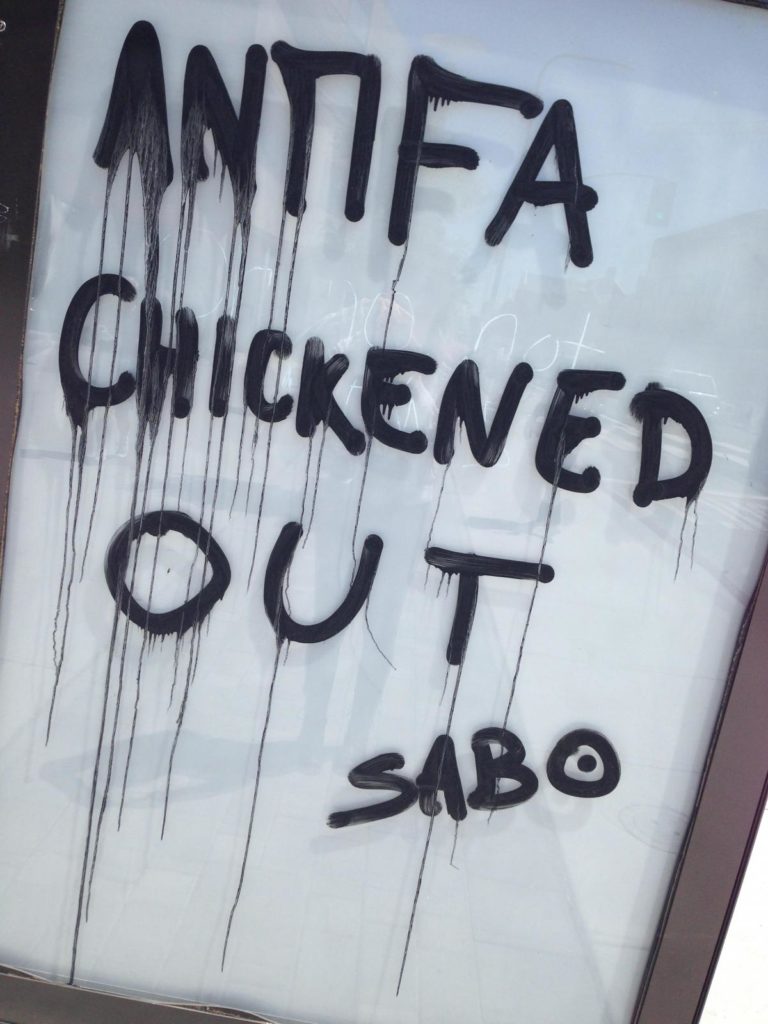
Dhillon that the student groups would be suing Berkeley for not providing a safe venue. The university replied that they could still not provide a secure location, but would provide a robust police presence to try to maintain safety if Coulter showed up on April 27 at 2 p.m. at and around Sproul Plaza.
This garnered criticism from ASUC Senator-elect Juniperangelica Cordova-Goff, who told the DailyCal that she believed the police’s “continued, heightened presence re-traumatizes students who come from communities with complicated relationships to the state,” and that the UCPD must “be active in recognizing the trauma their presence alone brings to some students,” working to “limit visibility while remaining an open resource to those who choose to use it.”
Despite precautions and the hullabaloo surrounding the event, Coulter never came to speak, there were no injuries, ANTIFA didn’t show up, the By Any Means Necessary group was sparse, and the protests were generally pretty peaceful. Whether this outcome was due to the massive police presence remains up for debate.
Misconception 5: Ann Coulter is just like any other famous speaker, and she shouldn’t have to adhere to any extra restrictions.
BCR president Troy Warden directly referred to Coulter as a “provocateur” at a press conference, and BridgeCal founder Pranav Jandhyala stated that his group does not agree with a lot of her opinions and understands that many see Coulter “as an inflammatory figure with destructive beliefs that disqualify her from appearing at an institution of higher learning.”
But Dhillon, while conceding that Coulter is a controversial figure and acknowledging that Berkeley has been the scene quite recently of violent protests, nonetheless asserts that Coulter should have been treated like any other prominent speaker, going so far as to compare a Coulter event to a sports game.
“Is the university telling us,” Dhillon wonders, “that it’s able to ensure safety and security at football games that have thousands of people at them, including drunk people … and yet when it comes to conservative speakers, it’s not able to fulfill its sworn peace officer duty to provide safety and security?”
“Is there a difference between someone like Milo Yiannopoulos and Arthur Brooks? That’s not for me to answer,” says assistant vice chancellor Dan Mogulof. “But clearly, there is a different public reaction to some of these individuals.”
In constitutional and first amendment law, says Kaye, such arguments don’t really fly. It’s not the size of the event but the nature of the event and the potential for violence that the university must assess. And when they invoke restrictions, the law requires that they go only as far as necessary to provide a secure environment while still allowing free speech.
In the case of Coulter, as long as the university proved that the restrictions were narrowly tailored in order to achieve this legitimate objective of security of the audience and of the speaker, the court should be good with it.
“Every speaker, every event is assessed by the police department on its own merits,” Mogulof says. “It has nothing to do with the public profile of an individual. It has nothing to do with their perspectives; it is solely based on an objective assessment of the possibility of a problem.”
Unlike Yiannopoulos and Coulter, the university has hosted conservative and libertarian speakers before without issue—including Elliot Abrams, Shawn Steel, Gary Becker, and Arthur Brooks.
“Is there a difference between someone like Milo Yiannopoulos and Arthur Brooks? That’s not for me to answer,” Mogulof says. “But clearly, there is a different public reaction to some of these individuals.”
The university, he went on to say, “believes it’s important that speakers of different perspectives come to this campus. [Registered student organizations] have the ability to invite speakers as they see fit. The campus has neither the legal ability nor the desire to interfere with that. And to interfere with that ability would be to engage in prior restraint on free speech and of all the affronts to free speech.
“Just imagine—what would have happened if the university had ignored the recommendations of the police department in terms of what sort of venue would need to be provided, and gone ahead and held the event, and students would have been injured? How many people would have been talking about the first amendment at that point?”
Aside from the free speech argument, Kaye says that an important question raised from this debate is about what all universities can do to protect particular kinds of speech and promote political dialog on campus.
“Are they doing things to encourage speakers to have space and for audiences to deal with speech in ways that are not violent and are responsive?” Kaye says. “That’s the bigger question.”











